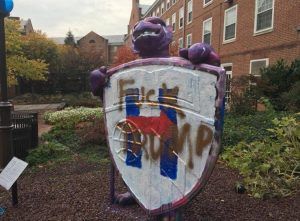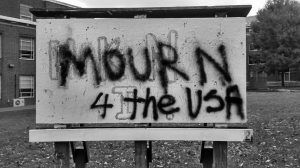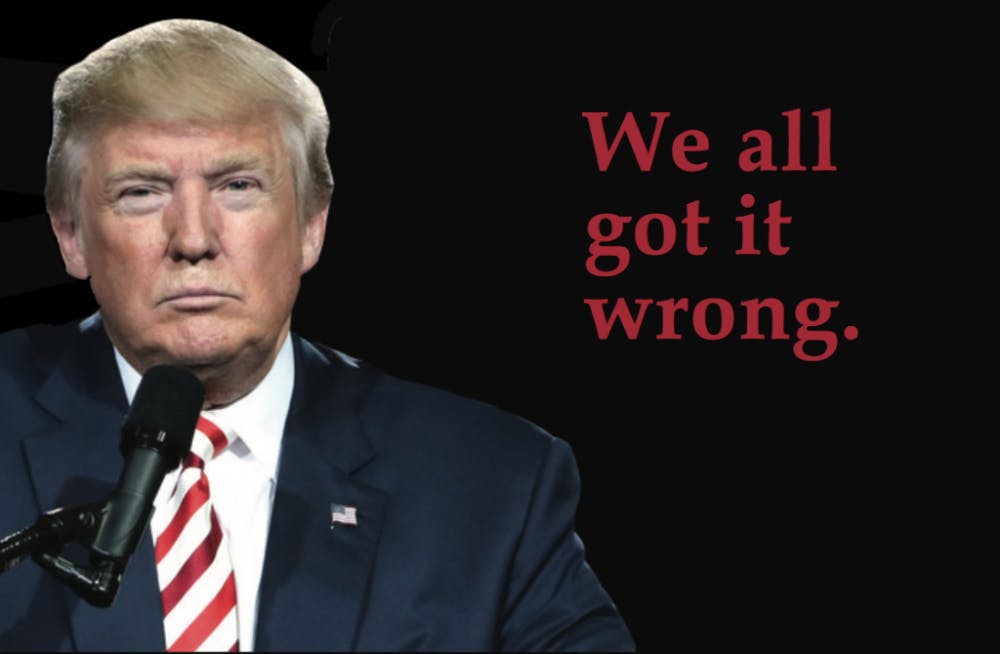President-elect Donald J. Trump’s unlikely victory early Wednesday morning stunned people across the nation and around the world. The results shocked Hopkins students, many of whom expressed frustration and fear.
In response, students spray painted the mural boards outside of Brody Learning Commons with phrases including ‘Grab them by the p*ssy’; ‘Do I deserve rights?’; ‘Mourn 4 the USA’; ‘Racism Wins’; and ‘Never Trump.’
Outside the Fresh Food Cafe (FFC), the Blue Jay statue was painted with Democratic nominee Hillary Clinton’s campaign logo and the words ‘F**k Trump’ superimposed. Other students sported Trump apparel on campus.
The Republican Party kept control of Congress, winning a majority in the Senate and the House of Representatives.
Co-president of Hopkins Feminists Linda Horn worried that Trump’s victory, which depended on the white vote, could threaten marginalized communities in the United States.
“People are processing, and with processing comes some shock, sadness, anger and that’s okay,” she said. “It’s also an issue about race and people who are racist and deeply xenophobic. Of course sexism plays a role, but as a club we’re really concerned with every person that’s affected... It’s not only women because it was a woman versus Trump. This has to do with the intersectionality of many different problems in our country.”
One of the major concerns raised by students in light of a Trump presidency is how his policies will affect women. In the past 18 months, Trump has publicly made lewd and derogatory comments about women.
Horn denounced Trump’s rhetoric because she said it normalizes sexual assault.

“Trump has been explicit that he plans to appoint judges who are going to be against Roe v. Wade, who will overturn that decision. This is progress from the ‘70s we’re talking about erasing,” Horn said. “You can explicitly talk about sexual assault and be accused of sexual assault by multiple women, and this country will still hand you the highest office in this land.”
Cynthia Hadler, president of Hopkins Democrats, vocalized the fears of Democrats on campus.
“Our classmates who are PoC, immigrants, the children of immigrants, practice a religion other than Christianity, LGBT and females are uncertain their rights will persist within the new administration,” she wrote in an email to The News-Letter.
Matthew Brown, a member of the Black Student Union (BSU), worries what Trump’s victory means for race relations in the United States.
“America messed up. We thought a Trump presidency would never happen, yet it’s going to,” Brown wrote in an email to The News-Letter. “I’m stunned that despite what Trump and his running mate [Mike] Pence stand for, Americans around the nation thought this team represented our country well. I’ve looked through their policies and I still wonder where my representation lies in someone who was actively endorsed by a former leader of the KKK.”
On Wednesday afternoon Terry Martinez, dean of student life, emailed students a list of spaces on campus where they could reflect on the election results.
“I was receiving emails from students saying that they were stressed, they were angry, they were fearful and they wanted to have gathering spaces to talk about that. The conversations in each of the rooms weren’t political at all. It was just for students to share their concerns,” Martinez said. “I know that there are students who are Trump supporters who probably are also afraid to share their perspectives.”
University President Ronald J. Daniels emphasized the importance of offering support to students.
“Members of our community have expressed a sense of anxiety over what the outcome of this election means for our country, for the world beyond, and of course, for those who were affected by vitriolic campaign rhetoric,” Daniels wrote in an email to The News-Letter. “The core ethos of the University is more important than ever. Universities stand for a commitment to ideas, to equal opportunity, to facts, to rigorous debate, to respect and civility.”
In light of the surprise and concern that has flooded campus over the election results, many students are outraged. Among them is co-chair of the Hopkins chapter of Students for a Democratic Society (SDS), Corey Payne.
“I’m disgusted with the election of a neo-fascist, and I’m disgusted with the liberal media’s normalization of this outcome,” Payne wrote in an email to The News-Letter. “We need to give ourselves the space and time to reflect on what this means for ourselves and for this country. But then we need to mobilize. We need to make it resoundingly clear that this man does not represent us. We need to fight back.”
Other students have already mobilized. About a dozen students travelled to Washington, D.C. yesterday to protest outside the White House. Junior David Weiner-Light, one of the students who went to D.C., spent the day chanting slogans and holding up anti-Trump signs.
He explained that he and his fellow protesters did not feel comfortable going about their day as planned. To them, going to class did not seem like an appropriate response.
“I definitely wouldn’t say we were protesting the result itself. We were all understanding and in agreement with how democracy works, but it was more to express our frustration and begrudgingly accept the new reality,” he said.
The election has shown a nation deeply divided, and Trump has centered his campaign around this growing split.

Liam Haviv, president of IDEAL, mentioned that in hindsight, Trump’s victory should not have been as much of a surprise. He compared the result to the shock exit of the United Kingdom from the European Union in June. However, Haviv stressed that frustration with Washington politics were contributing factors to Trump’s win.
“People are unhappy, and they are tapping into something that we just aren’t seeing. Every foreign policy expert, every major newspaper, every celebrity — they all came out for Clinton. And it didn’t matter. Our job is going to be to understand why,” he said.
Senior Alexander Fine said that the election reflected discontent among white Americans.
“Last night was the culmination of a wave of anti-establishment nativism that has swept across the western world,” he said. “Due to globalization and free trade, white blue-collar workers in the Rust Belt feel marginalized and forgotten by the economic and political elites.”
Senior Elliot Frumkin acknowledged that liberal college environments might have prevented Hopkins students from understanding the extent of Trump’s support.
“While most at Hopkins might not even know anyone who voted for Trump, we have to realize that Hopkins is a bubble of young, educated, privileged, liberal ideology and that others around the country disagree [with],” he said.
Joseph Klein, a member of the College Republicans who does not support Trump, said that Democrats should have been more proactive leading up to the election if they had wanted to prevent a Trump presidency.
“Everyone who cared so much and is so upset today, where were you for the past six months?” Klein asked. “I know you were on Facebook and Twitter and Tumblr and that’s all great. But you don’t vote on Facebook.”
Klein cited his experience as a volunteer for Ohio Governor John Kasich during the primaries, stressing how easy it is to help with a political campaign. He highlighted that two swing states, Virgina and Pennsylvania, are an hour drive from campus and that more students should have volunteered.
“If Pennsylvania [was lost] by around 50,000 votes and everyone made 30 calls a day, [Clinton] could have won Pennsylvania. If she won Pennsylvania, it would have been a much different game right now,” he said. “[Trump’s] people showed up, they voted, they volunteered, they went to the polls. Her people didn’t.”
Klein expressed his belief that the stigma surrounding Trump may have skewed initial beliefs that predicted Clinton would win.
“That’s the million dollar question. How did he do it?” Klein asked. “As far as polling goes, this is something that I learned when I door-knocked. I knocked on a Kasich door and they were Kasich and they were proud of that. [If] I knocked on a Cruz door, they would definitely tell you that they were a Cruz supporter. You knock on a Trump door, and they didn’t say anything.”
Many, including Hopkins alumna Hallie Jackson, a journalist who was MSNBC’s embedded reporter during the Republican primary and general election campaign, concede that Trump ran an effective campaign.
“Trump has showed us the power of having a million or two million Twitter followers. With a single message or a single tweet, he is, at times, driving the storyline for an entire day or sometimes longer. We haven’t seen that before,” Jackson said. “What we’ve seen from him in particular has been a really interesting change or evolution of the way that we see social media being used in a presidential campaign.”
Despite the Republican Party’s future control of both Congress and the Presidency, many Hopkins faculty question whether the party will govern effectively.
One skeptic is Steven David, a professor of international relations who specializes in security politics.
“One can hope that he will get good advisers, but Trump does not have a record of listening to others, and most of the respected Republican foreign policy strategists have declared they will never work for him,” David wrote in an email to The News-Letter. “In domestic politics, there are significant checks and balances on a President. Less so in foreign policy, especially when it comes to sending troops into battle and heaven help us, launching a nuclear attack. America is a resilient country, and I expect we will survive a Trump presidency. But I sure wish we didn’t have to take the risk.”
Adam Sheingate, professor and chair of the political science department, emphasized how the election has exposed the need for America to self-reflect and work toward fixing problems inherent to its political system.
“If you’re an optimist like me — that the system is robust — this is like a stress test... We’ll show ourselves to be up to the test,” he said. “The thing to remember is that we have a system of government that separates power and diffuses power to different levels of government.”





